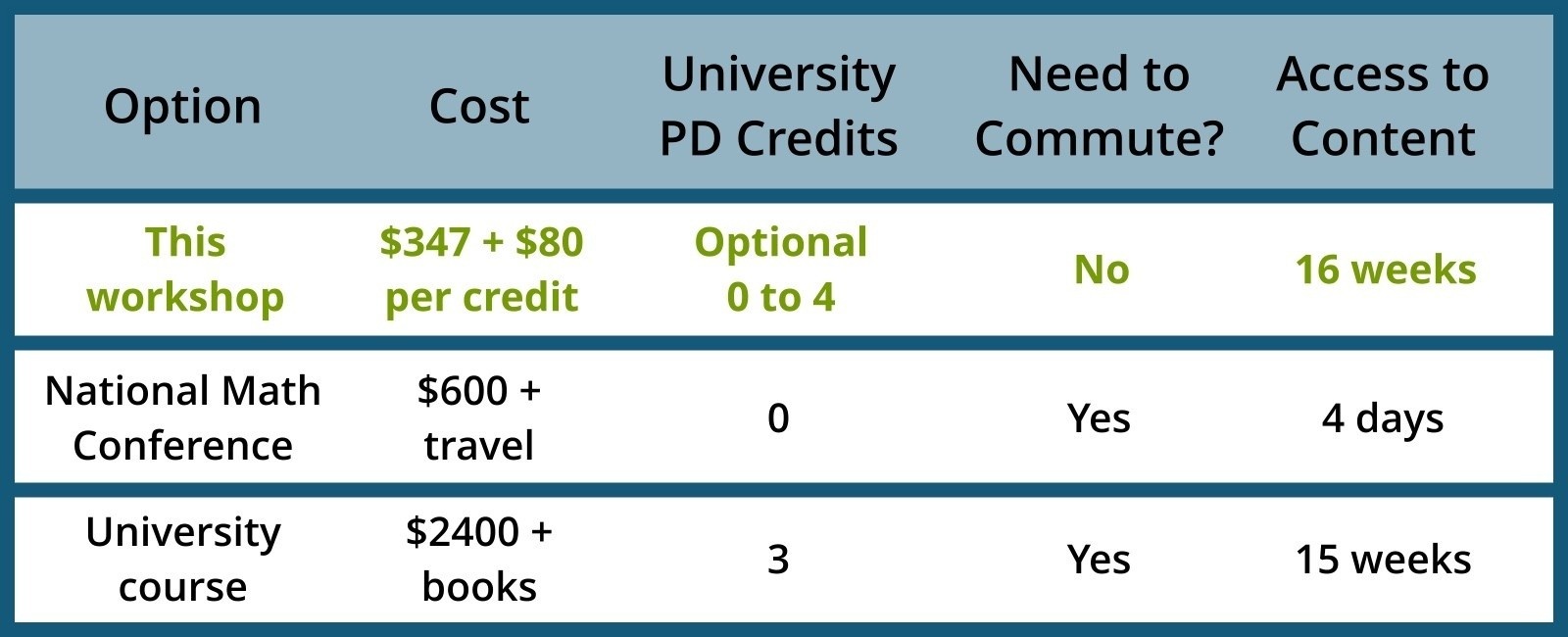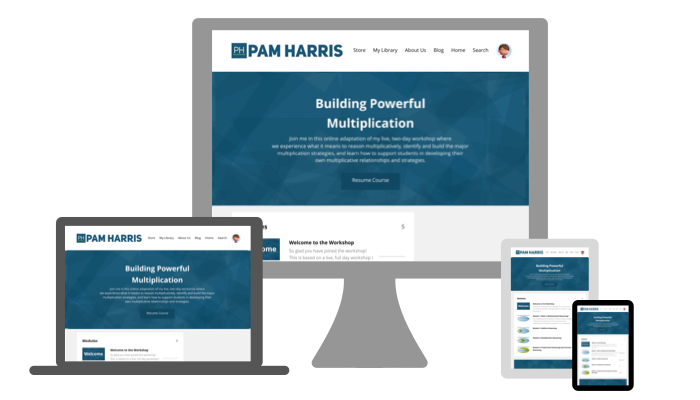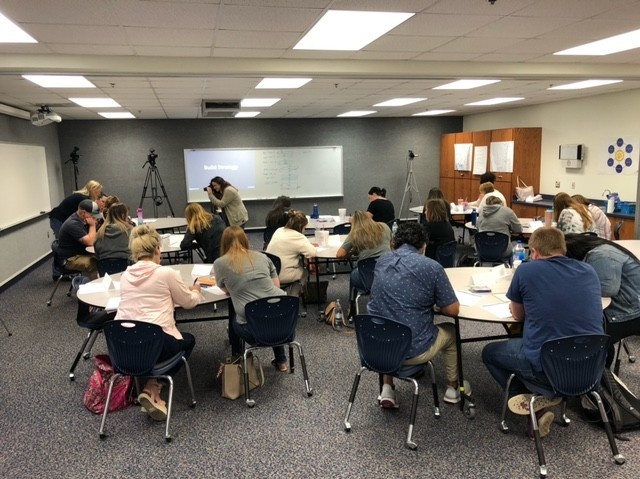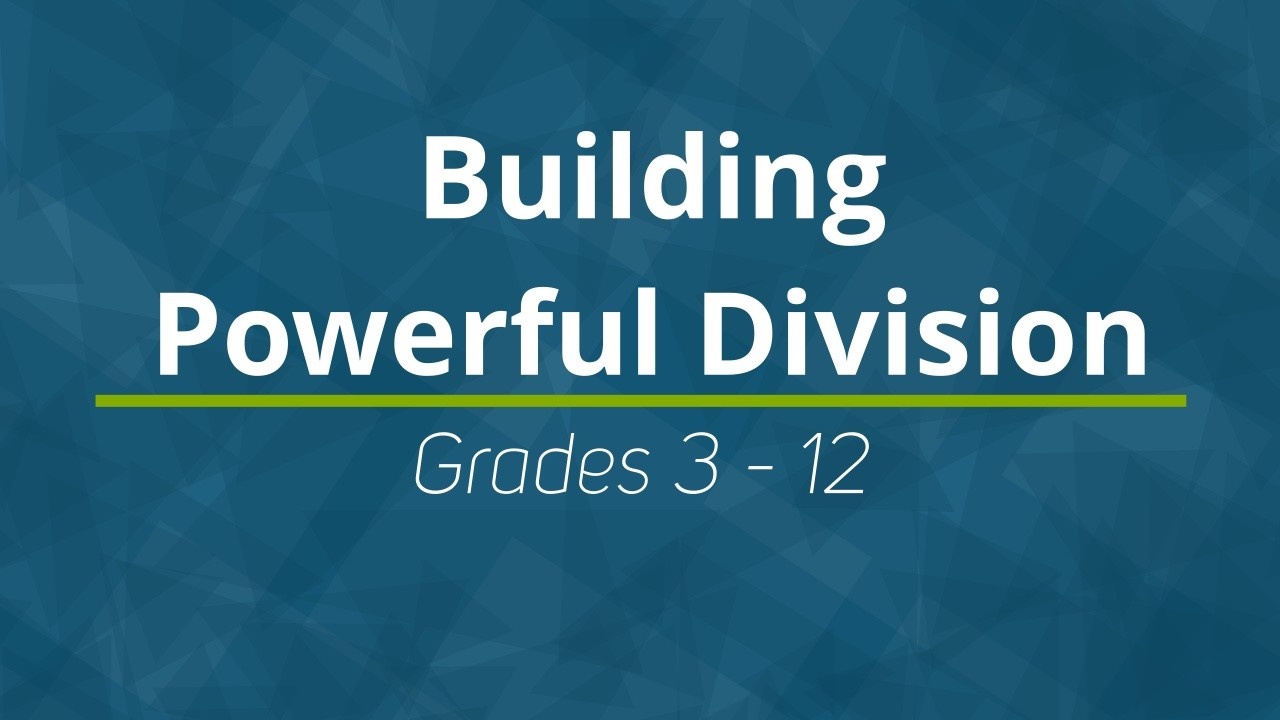What is in the Workshop?
Module 1: What is Mathematizing?
What Will I Learn?
- What "Math is Figure-Out-Able" means, what is real math, and what it means to mathematize
- What it means to be a mentor to young mathematicians
- Why it is important to develop reasoning, not just get answers
- An important subtraction relationship and strategy (subtraction is so important in division)
- Steps to take action in your classroom
Why Is This Important?
This is the why, the background, the setting that sets the stage for the rest of the workshop, so that you can implement lessons and strategies knowing how it all fits together.
___________________________________________________
Module 2: Building the Important Models of Division
What Will I Learn?
- How to help students connect multiplication to division
- A spatial model for building the connection of multiplication to division
- A model for recording thinking
- Problem Strings to build each model with students
- What visual models have to do with access and moving all students forward
- Steps to take action in your classroom
Why Is This Important?
Students need to develop the major models for multiplication and division as visual representations of numerical and spatial relationships. Students also need to transition to use those models as tools for thinking. Teachers need to know the progression of models, which ones to use with each string and in what order, and how to model-represent student thinking.
___________________________________________________
Module 3: Division Strategies
What Will I Learn?
- Each of the five major, important division strategies
- How to use Problem Strings to develop each of the major strategies
- When and how to build the properties on which the strategies are based
- How to represent student thinking on open arrays and ratio tables
- Steps to take action in your classroom
Why Is This Important?
You can solve any problem, that's reasonable to solve without a calculator, by using one of the five major, important strategies. It's not about a huge, undefinable set of strategies. Rather, it's about building relationships in students' heads so that these strategies become natural inclinations. Students look at the problem and let the numbers dictate the strategy based on the inherent relationships.
___________________________________________________
Module 4: Two Interpretations of Division
What Will I Learn?
- The two interpretations of division and why teachers need to know them but students don’t
- How context and decontextualizing contribute to sense making and flexibility
- How models and strategies work together and how they differ
- Steps to take action in your classroom
Why Is This Important?
Different division problems represent the two interpretations of division. Students need external guidance to develop both interpretations and realize that both can be solved with division.
Teachers need to know both interpretations and how to support students to develop both as multiplicative situations that can be solved with division.
___________________________________________________
Module 5: Top 3 Types of Tasks for Student Success
What Will I Learn?
- What Rich Tasks are and how they can be used to develop big ideas
- Problem Strings to introduce and solidify strategies, models, and big ideas
- How Problem Strings and Problem Talks work together and how they differ
- How to use Problem Talks to compare strategies and for assessment
- How to sequence lessons to maximize learning
- Steps to take action in your classroom
Why Is This Important?
This is the how-to-do-it module. We study different types of instructional tasks and routines, discerning their role in constructing mathematical ideas in learners’ brains. Our goal is to always be moving the math and the mathematician forward. Understanding how to use and leverage different instructional tasks allows you to ensure success for all your students all of the time.
___________________________________________________
Module 6: Expert Teacher Moves that Help You Help Your Students
What Will I Learn?
- High leverage teacher moves to encourage student sense making
- Teacher moves that support equity and access
- Teacher moves to differentiate — to support and challenge all learners
- How to support meaningful discourse to facilitate learning
- Steps to take action in your classroom
Why Is This Important?
Teaching in a way that allows all students to learn and grow is not a trivial task. There are purposeful moves teachers can make that promote class discussion and mathematical dialogue, position all students as sense makers, and build a culture of curiosity and empowerment.
In this module, you’ll learn the high level teacher moves that make the learning happen like a pro.
___________________________________________________
Module 7: Developing Division in Younger Learners and Extending Division in Higher Math (optional)
What Will I Learn?
- How to help beginners reason about the relationship between multiplication and division
- Games that support division and are easily differentiated
- How to help students think and reason through decimal division
- How to help students think and reason through polynomial division without using an algorithm
- Steps to take action in your classroom
Why Is This Important?
No matter what grade you teach, this module has something for you. Mastering the multiplication facts does not automatically lead to mastery of division facts. This module shows you how to help students make that necessary connection between multiplication and division.
Also, when teachers of higher math learn about division without algorithms, it impacts what they teach. Learn some higher math division strategies for rational expressions and polynomial division grounded in thinking and reasoning.
___________________________________________________
Live Q&A Sessions With Pam
During the workshop you will have the opportunity to submit questions to Pam for her to answer during two live Q&A sessions. The sessions will be recorded and you will have access to them.








